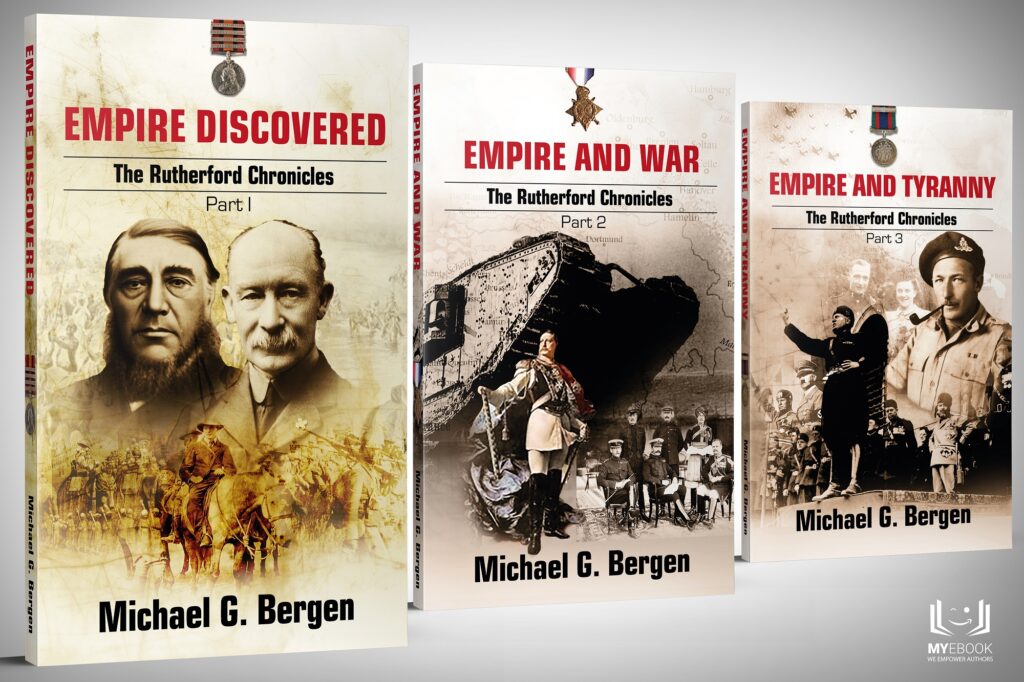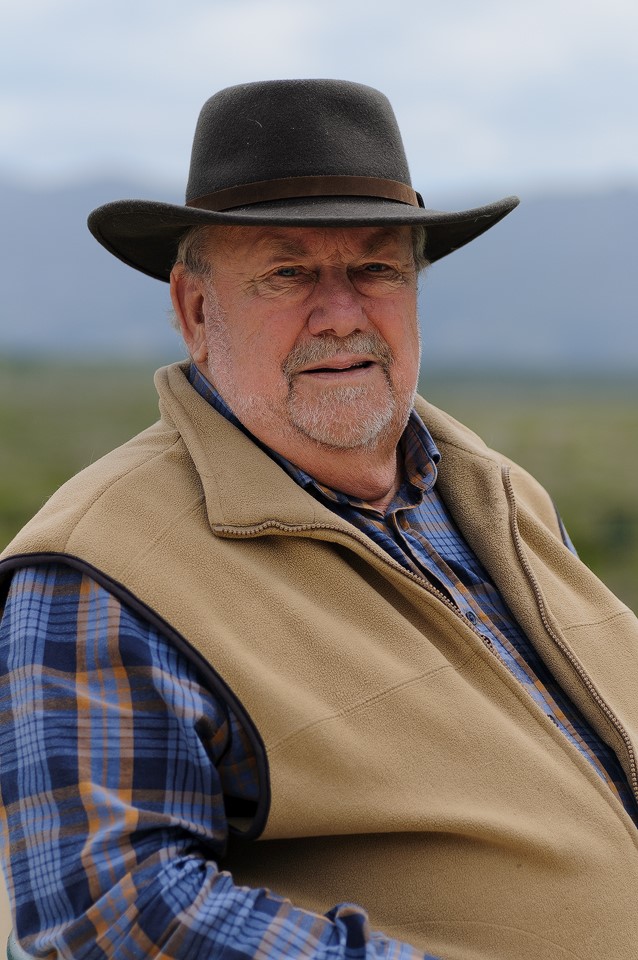

Can you tell us a little about yourself?
I am a British-born Canadian who has lived and worked most of my adult life in eight cities in five countries on three continents.
I was born in Croydon, South London, England, during the Nazi V-1 and V-2 “vengeance” bombings of World War Two. My father was a Canadian soldier, and my mother was a sweet and innocent English girl. I’m not sure who talked to whom about marriage, but I was the outcome. My father left for Italy the day after my birth as part of the British, Canadian, and American Italian Campaign in Churchill’s Soft Underbelly of Europe. My father would become the principal character of my third novel.
My mother’s father was a Geordie from the Northeast of England who had fought in the Boer War in South Africa, subsequently serving as a British soldier in British India and years later fought briefly in the trenches of WW1 France, and four years in POW camps in Northern Germany. He became my principal character for my first and second books.
I grew up in Montreal, Canada, from the age of two. After a normal and model childhood in school, Cub Scouts, Scouts, and Sea Cadets, I joined the Royal Canadian Navy in 1961 as a Sonarman, hunting Soviet submarines in the Atlantic. I took part in the Cuban Missile Crisis, inspecting hundreds of Soviet fishing boats on the Grand Banks of Canada, looking for hidden missiles. We also took part in the search for the US advanced nuclear submarine USS Thresher, which sank in the deep Atlantic off the Massachusetts coast. I also participated in three Cold War naval exercises during that time.
After I left the Navy, I studied Economics at Concordia University in Montreal and worked in the computer industry by accident to pay my way through my studies. That’s when I first became interested in writing poetry and novels, but I put them on hold after marrying.
I put my studies on hold while taking a gap year in Europe and the UK. While there, I secured an excellent opportunity with IBM to conduct computerized medical research in Heidelberg, Germany, while raising a family. After seven years of research, I was transferred to marketing in Paris, France, for three years. I left IBM and worked for the computing company of the Atomic Energy Agency of France, computer services which I offered in Germany.
In 1983, I was offered a three-year assignment in South Africa, started my own IT company, and ended up staying in that country for many years and retiring there.
Tell us a bit about your book.
The Rutherford Chronicles series of four books is about a tumultuous and personal family journey through the 20th century. This series is about empires and war:
1. Empire Discovered (published) – 2nd Boer War in South Africa (1899-1902)
2. Empire and War (published) – The Great War, WW1 (1914-1918).
3. Empire and Tyranny (published) – World War 2 (1939-1945)
4. Empires Lost: Cold War Memoir (pending) – The Cold War (1945-1991)
These books cover the horror of war experienced by my grandfather, my father and myself. We were personally involved in those four significant conflicts of human history’s most deadly and costly one hundred years.
Each book covers accurate historical timelines, context and events in detail. However, each book’s story revolves around the protagonists’ personal experiences while engaged in the various episodes of each period and war.
Empires Lost: Cold War Memoir, The Rutherford Chronicles, Part 4
The fourth book, Empires Lost: Cold War Memoir, is nearing completion and should be published within 6 to 8 weeks. It relates the author’s experiences during the Cold War. I lived in Cold War hotspots worldwide from WW2 to the end of the Cold War and the South African struggle for majority rule. The memoir covers the second half of the 20th-century section of a family journey.
The memoir begins with my early childhood years in Montreal. It gradually introduces the developing onset of the Cold War, including the Soviets grabbing and holding onto the Eastern European countries. It briefly explains the Soviet plans for an aggressively expansive future as highlighted and predicted by George Orwell, who first used the term Cold War, and Winston Churchill, who coined the Iron Curtain and Truman Doctrine of US President Harry S. Truman. It covers the Korean War as an unregistered conflict during my childhood. During my university years, it covers the constant negative news arriving from the Vietnam Proxy War and the Antiwar protests.
After telling the story of my later childhood, I cover my three years in the Royal Canadian Navy during the John F. Kennedy years, the Bay of Pigs and the Cuban Missile Crises and the search for the advanced US nuclear submarine USS Thresher that sank in the deep Atlantic of Massachusetts. It follows through my university years during the Vietnam War, on into a divided Germany and Berlin, my research work in Germany and experiences with the terrorist attacks of Germany’s Red Army Faction happening then and meeting and exchanging views with young East German scientists at a conference in Sweden. While in Germany, I visited West Berlin twice and East Berlin once, and I visited the dangerous East-West German border in multiple places along its length.
The book also covers at length my experiences with the terrorism of the anti-Apartheid operatives in South Africa leading up to the first majority elections in 1994, during which I met and shook hands with Nelson and Winnie Mandela soon after his
release from prison. My underlying message about that time and conflict is that it was, in effect, a proxy conflict of the Cold War due to Soviet financing and terrorism training of the ANC, SACP, and PAC operatives in the USSR and Russia.
The Rutherford Chronicles seeks to learn from the history of all those wars and the deaths and maiming of millions of young people? What did we learn from the history of all those wars and the deaths and maiming of millions of young people?
In 1906, the famous Spanish-American philosopher, essayist, poet and novelist George Santayana partially answered when he wrote, “Those who forget the past are condemned to repeat it.”
So, I search for the answers to questions like, why do we allow our leaders and politicians to lead us into war after war? And why do the youth of every generation rush to make themselves available to fight and die in these wars?
How do all of these lessons learned from the 20th-century wars relate to the world we live in today, with its global tensions backed by nuclear weapons? Are we not in another Cold War teetering on becoming another Hot War, WW3?
If we cannot answer these questions and act to end conflicts and wars, with the weapons now at our disposal, the consequences could be the worst in human history!
I try to understand and answer those critical underlying questions through the themes in the four books in the series and through the personal family stories of the three protagonists involved. Still, the questions keep appearing, war after war:
Have you always wanted to become a writer?
Yes, ever since university. Unfortunately, I could not fulfil my desire to write fiction until later in life due to obligations for raising my family. I started writing seriously about ten years ago, and the series results from that effort.
What has helped or hindered you most when writing a book?
That’s a good question, and I’ve pondered it often. For example, writing is a lonely occupation, especially historical fiction, and is not appreciated by everyone in one’s circle of friends and acquaintances. That is unfortunate since discussion can help uncover information and inspire, perhaps. However, working alone allows for total concentration when researching and writing. So it’s both a hindrance in a way, as well as an advantage.
What inspired the idea for your book?
As I mentioned, I always wanted to write, but my writing was limited to dry technical and business documents during my career. I started researching my ancestors about a dozen years ago and discovered their fascinating background stories. That set it off. I then noticed the common themes running through all their stories and mine, which inspired the writing of the series.
What advice would you give a writer working on their first book?
Stick with it! Learn constantly from reading or from any source you can find. Don’t get discouraged by how long it takes and how difficult it may seem. Turn that into fun, be inspired by your writing, push hard, and keep learning.
What is the most valuable piece of advice you’ve been given about writing?
Not to give up. I have a small circle of supporters who keep giving me that advice.
Where do you get your information or ideas for your books?
Ah, now that’s a good one! Being a Historical Fiction Writer, once I have an idea of the conflict and my protagonist’s part in it, for example, the regiment they were part of, I seek out the regimental war diaries, logs or other historical books that cover their involvement in battles accurately and in detail.
Another example I learned about was my grandfather’s internment in German POW camps in Germany during World War I. We knew he had been a German POW but didn’t know where. I discovered that the International Red Cross database has every entry and movement of every prisoner of war since WW1. He was held in three separate camps, and through further research, I was able to reconstruct the environments and conditions he lived under in each camp.
I read all or parts of some twenty books on the Boer War in South Africa but settled on three or four that gave me insight, perspective and details from both sides.
Another advantage is that I visited virtually every site I write about in the three historical fiction novels through my international travels. Of course, I lived the fourth book.